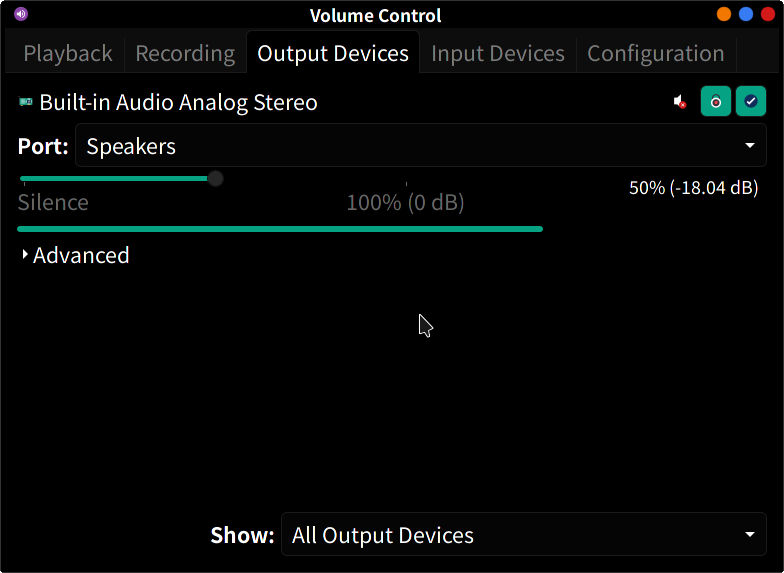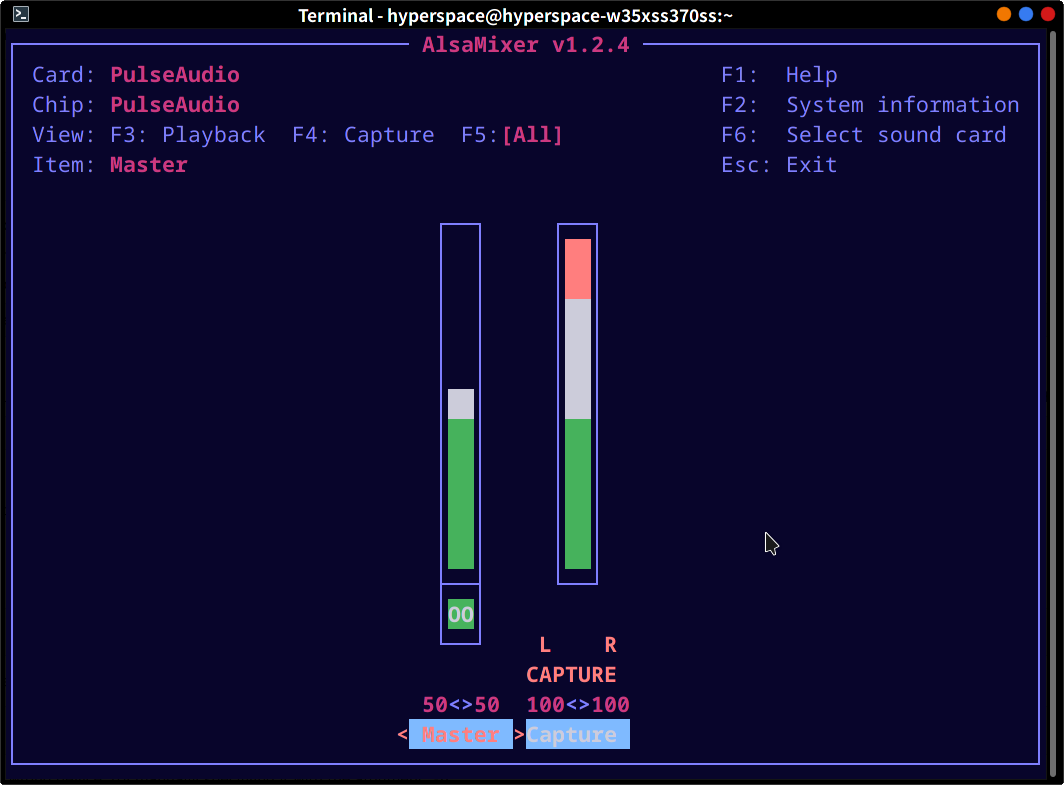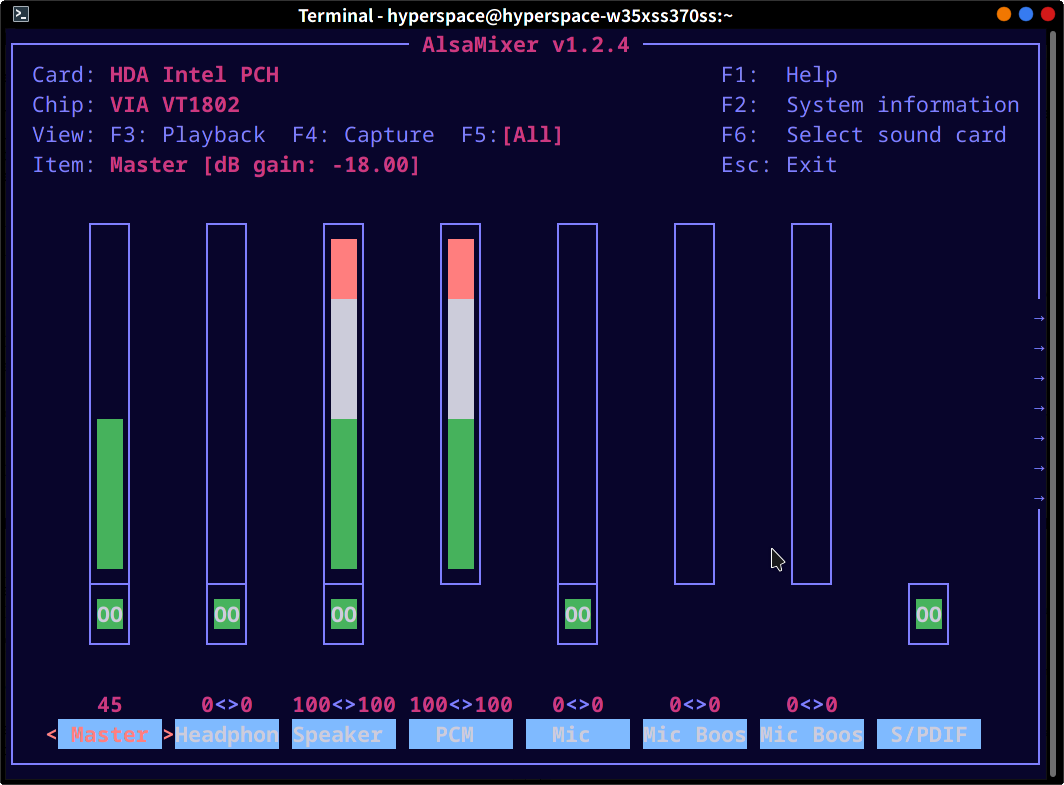When I try to play any sound (DeadBeef, mpv, Waterfox-G3, Discord) there’s no sound being outputted despite pavucontrol telling me that it is playing something:

My mic doesnt work too. I inferred this from Discord’s built in mic test from a complete lack of audio level, as well as my friends using the text channel to tell me they can’t hear me. PulseAudio usually has my mic level on constantly irregardless of any application using it, but that audio level bar has disappeared:

This happened upon start up. In the past, this happens rarely and randomly, and can be fixed by simply restarting again, so I didn’t look into it any further then. Now, despite numerous reboots, it seems that the lack of sound is permanent!
My alsamixer’s default device isn’t muted:

The HDA Intel PCH screenshot too for good measure:

Here’s my output for “pacmd list-sinks”:
1 sink(s) available.
* index: 0
name: <alsa_output.pci-0000_00_1b.0.analog-stereo>
driver: <module-alsa-card.c>
flags: HARDWARE HW_MUTE_CTRL HW_VOLUME_CTRL DECIBEL_VOLUME LATENCY DYNAMIC_LATENCY
state: SUSPENDED
suspend cause: IDLE
priority: 9039
volume: front-left: 32800 / 50% / -18.04 dB, front-right: 32800 / 50% / -18.04 dB
balance 0.00
base volume: 65536 / 100% / 0.00 dB
volume steps: 65537
muted: no
current latency: 0.00 ms
max request: 0 KiB
max rewind: 0 KiB
monitor source: 0
sample spec: s16le 2ch 44100Hz
channel map: front-left,front-right
Stereo
used by: 0
linked by: 0
configured latency: 0.00 ms; range is 0.50 .. 2000.00 ms
card: 1 <alsa_card.pci-0000_00_1b.0>
module: 7
properties:
alsa.resolution_bits = "16"
device.api = "alsa"
device.class = "sound"
alsa.class = "generic"
alsa.subclass = "generic-mix"
alsa.name = "VT1802 Analog"
alsa.id = "VT1802 Analog"
alsa.subdevice = "0"
alsa.subdevice_name = "subdevice #0"
alsa.device = "0"
alsa.card = "1"
alsa.card_name = "HDA Intel PCH"
alsa.long_card_name = "HDA Intel PCH at 0xf7a10000 irq 35"
alsa.driver_name = "snd_hda_intel"
device.bus_path = "pci-0000:00:1b.0"
sysfs.path = "/devices/pci0000:00/0000:00:1b.0/sound/card1"
device.bus = "pci"
device.vendor.id = "8086"
device.vendor.name = "Intel Corporation"
device.product.id = "8c20"
device.product.name = "8 Series/C220 Series Chipset High Definition Audio Controller"
device.form_factor = "internal"
device.string = "front:1"
device.buffering.buffer_size = "352800"
device.buffering.fragment_size = "176400"
device.access_mode = "mmap+timer"
device.profile.name = "analog-stereo"
device.profile.description = "Analog Stereo"
device.description = "Built-in Audio Analog Stereo"
module-udev-detect.discovered = "1"
device.icon_name = "audio-card-pci"
ports:
analog-output-speaker: Speakers (priority 10000, latency offset 0 usec, available: unknown)
properties:
device.icon_name = "audio-speakers"
analog-output-headphones: Headphones (priority 9900, latency offset 0 usec, available: no)
properties:
device.icon_name = "audio-headphones"
active port: <analog-output-speaker>
“speaker-test -c 2” works fine in the terminal, but doesn’t actually output sound:
speaker-test 1.2.4
Playback device is default
Stream parameters are 48000Hz, S16_LE, 2 channels
Using 16 octaves of pink noise
Rate set to 48000Hz (requested 48000Hz)
Buffer size range from 96 to 1048576
Period size range from 32 to 349526
Using max buffer size 1048576
Periods = 4
was set period_size = 262144
was set buffer_size = 1048576
0 - Front Left
1 - Front Right
Time per period = 10.941952
0 - Front Left
1 - Front Right
Time per period = 10.936493
Interestingly, “speaker-test -D default:PCH -c 2” gives me this:
speaker-test 1.2.4
Playback device is default:PCH
Stream parameters are 48000Hz, S16_LE, 2 channels
Using 16 octaves of pink noise
ALSA lib conf.c:5200:(snd_config_expand) Unknown parameters PCH
ALSA lib pcm.c:2660:(snd_pcm_open_noupdate) Unknown PCM default:PCH
Playback open error: -22,Invalid argument
Here’s the output for “aplay -l”:
**** List of PLAYBACK Hardware Devices ****
card 0: HDMI [HDA Intel HDMI], device 3: HDMI 0 [HDMI 0]
Subdevices: 1/1
Subdevice #0: subdevice #0
card 0: HDMI [HDA Intel HDMI], device 7: HDMI 1 [HDMI 1]
Subdevices: 1/1
Subdevice #0: subdevice #0
card 0: HDMI [HDA Intel HDMI], device 8: HDMI 2 [HDMI 2]
Subdevices: 1/1
Subdevice #0: subdevice #0
card 0: HDMI [HDA Intel HDMI], device 9: HDMI 3 [HDMI 3]
Subdevices: 1/1
Subdevice #0: subdevice #0
card 0: HDMI [HDA Intel HDMI], device 10: HDMI 4 [HDMI 4]
Subdevices: 1/1
Subdevice #0: subdevice #0
card 1: PCH [HDA Intel PCH], device 0: VT1802 Analog [VT1802 Analog]
Subdevices: 0/1
Subdevice #0: subdevice #0
card 1: PCH [HDA Intel PCH], device 1: VT1802 Digital [VT1802 Digital]
Subdevices: 1/1
Subdevice #0: subdevice #0
card 1: PCH [HDA Intel PCH], device 2: VT1802 Alt Analog [VT1802 Alt Analog]
Subdevices: 1/1
Subdevice #0: subdevice #0
As well as “arecord -l”:
**** List of CAPTURE Hardware Devices ****
card 1: PCH [HDA Intel PCH], device 0: VT1802 Analog [VT1802 Analog]
Subdevices: 0/1
Subdevice #0: subdevice #0
I tried booting up a Live USB of EndeavourOS, and the default player (upon audio file double-click, forgot the player’s name) outputs sound normally. Thus I believe my issue is of software, not hardware. However, I’m not sure if the issue is within ALSA or PulseAudio.
If you need any more information that I’ve forgotten to include in this post, please let me know!

 ) for me.
) for me.
